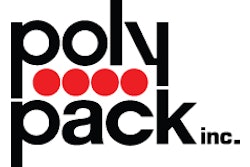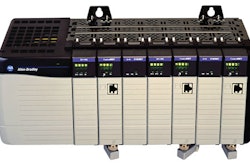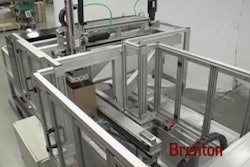Since 1980, when it launched its business supplying construction sites with portable, packaged water, Unlimited Water Processing, Inc., St. Louis, has kept a close eye on packaging trends. Over the years, the company has evolved in its delivery methods to meet changing consumer preferences. Today it serves corporate customers with private-label branded water products in single-use PET bottles and larger, refillable plastic containers.
While the one-way bottles provide the professional appearance and recyclable benefits sought by corporate customers, until recently Unlimited Water's multipack packages were cumbersome and generic in appearance. The company packed the bottles in corrugated cases that provided protection during transport, but left the customer with mountains of corrugated material to break down and dispose of.
In July 2010, Unlimited Water addressed these consumer concerns, becoming the first to use the Nested Pack™ shrink-pack concept from Polypack. Nested Packs use a unique, staggered-row bottle configuration that results in a sturdy, stable bundle that completely eliminates the need for corrugated trays or pads.
According to Elliott Henry, owner of Unlimited Water, customers love the new, more sustainable package because it uses fewer materials and is easier to dispose of, and because it is more attractive. Unlimited Water loves the new pack because it reduces the company's cost per case from roughly 45 cents to 10 cents, it provides an improved product appearance, and it has opened up a significant amount of floor space in the company's facility. "It's a better fit all the way around," says Henry.
Customer-driven packaging
Through its 30-year history, Unlimited Water has followed the market for portable water, adjusting its strategy to meet new opportunities. Its first package, a single-serve paperboard carton, was delivered to construction sites in ice-packed coolers. In the mid-'90s, cartons gave way to 8-oz high-density polyethylene bottles that were blow-molded and filled in-house and shipped in corrugated cases to customers such as railways and coal mines.
When the bottled water phenomenon hit the mainstream, Unlimited Water moved to PET bottles and directed its efforts at corporate customers interested in branded product. "As we tapped into corporate America, we had to go to a PET bottle because it was something that was more presentable and more professional, and it met the whole ‘going-green' trend," relates Unlimited Water operations manager Darren Shepard. "So customers have pretty much dictated along the way how we operate."
The move to Polypack's Nested Pack was no exception. As bottled water multipacks at retail moved into shrink-wrapped packages supported by corrugated trays or pads, Unlimited Water's customers looked to them for the same convenience. Says Henry, "We put 72 cases on a pallet. So if you have a pallet of corrugated cases, it takes some time to break the cases down, stack them up, and transport them for disposal. Our customers liked the convenience of what they saw in the consumer market and began to question us."
Initially, Unlimited Water was looking to duplicate traditional retail packs, through the purchase of a tray packer and tray wrapper. But Polypack's patented technology leap-frogged this conventional process. Recalls Polypack distribution sales manager Kevin Harris, "We showed Mr. Henry this package, and he liked it and he understood the advantages that it offered from a manufacturing standpoint, a cost standpoint, and a marketing standpoint. He transitioned from his original desire to purchase tray-packing and tray-wrapping equipment into this Nested Pack."
More points of contact ensures stability
To produce the Nested Pack, Unlimited Water chose Polypack's Tango-24L shrink-wrapper, capable of running both clear and print-registered film at speeds to 20 wraps/min. The Tango series is one of two lines from Polypack—the other is the higher-speed Clearprint series—able to produce the Nested Pack.
The geometry of the Nested Pack's staggered rows is created as bottles enter the machine in single file and are then divided into multiple lanes. Bottles are then accumulated in a nested pattern and are held in that position throughout wrapping and shrinking. The resulting pack is virtually the same size as a traditional tray pack: A Nested Pack holding 24 bottles measures 16.25 x 10 in. versus the 16 x 10-in. dimensions of a traditional tray pack.
What provides the package with its stability is the triangular geometry of the bottle layout. The individual bottles that comprise the Nested Pack fill the voids found in traditional packs, providing more points of contact for each bottle. With a traditional square multipack, bottles have anywhere from two to four points of contact, depending on where they are located in the pack. The Nested Pack offers from three to six. Explains Harris, "We are actually using the bottles themselves to provide the strength and support that the multipack needs, rather than depending on a tray or pad."
The film for the Nested Pack is the same gauge as film used with traditional packs. Unlimited Water is using a 2.5-mil three-layer co-extruded polyethylene film from Film Source Intl. Emphasizing the pack's sturdiness, Henry says, "You could pick the bundle up and throw it against the wall, you could drop it on the floor, and it still stays together."
The Tango-24L also offers flexibility, accommodating a range of bottle, as well as pack sizes. Unlimited Water bundles 12-, 16.9-, and 24-oz bottles, as well as a 1-L bottle size, all of which Henry confirms are easily accommodated by the shrink wrapper. "The machine changes over fast," he says. "In approximately 30 minutes, you can be up and running with a new package."
The Nested Pack can be used for a variety of bottle counts—from seven to 41—and can be produced in odd-number configurations, creating a variety of shapes. For example, with the Nested Pack, packagers can offer 25-count multipack for promotions; 7-count multipacks, with a round shape; and 12-count oval bundles.
For shipment to customers, packs are manually palletized in a cross-stack configuration, producing a stable load. "We ship lots of water out of town on pallets, and we haven't had one problem," says Henry.
Unsupported packs a trend-setter
For Unlimited Water, removing corrugated material completely from its secondary packaging has resulted in measurable cost savings. Most notably, the Nested Packs cost an average of 35 cents less per bundle versus corrugated cases. "Buying corrugated is just like purchasing gasoline," says Henry. "Today the price is down, next week it's up—it's all over the board. Also, if you are buying corrugated, you have to buy in so much volume in order to get a good price."
Henry recalls the 18-wheeler trucks filled floor-to-ceiling with corrugated blanks that used to pull up to the door of his facility. "You could have $7,000 or $8,000 right there, tied up in cases," he says. These cases not only filled up the delivery truck, they also took up a large amount of floor space in Unlimited Water's facility, space that is now free for other uses.
The appearance of the Nested Pack, with either clear or preprinted film, is also much improved—in fact, it's "superior," according to Shepard—and is less susceptible to environmental conditions such as humidity.
Says Henry, "It has really enhanced the look of our product, with the labels visible through the clear-film shrink wrap." As of presstime, Unlimited Water was just gearing up to use print-registered film
as well.
With the purchase of the Tango-24L, Henry says the company is pretty much set in terms of its equipment needs. For now, Unlimited Water is not only keeping up with water-bottle packaging trends but is also setting them, as well.
























